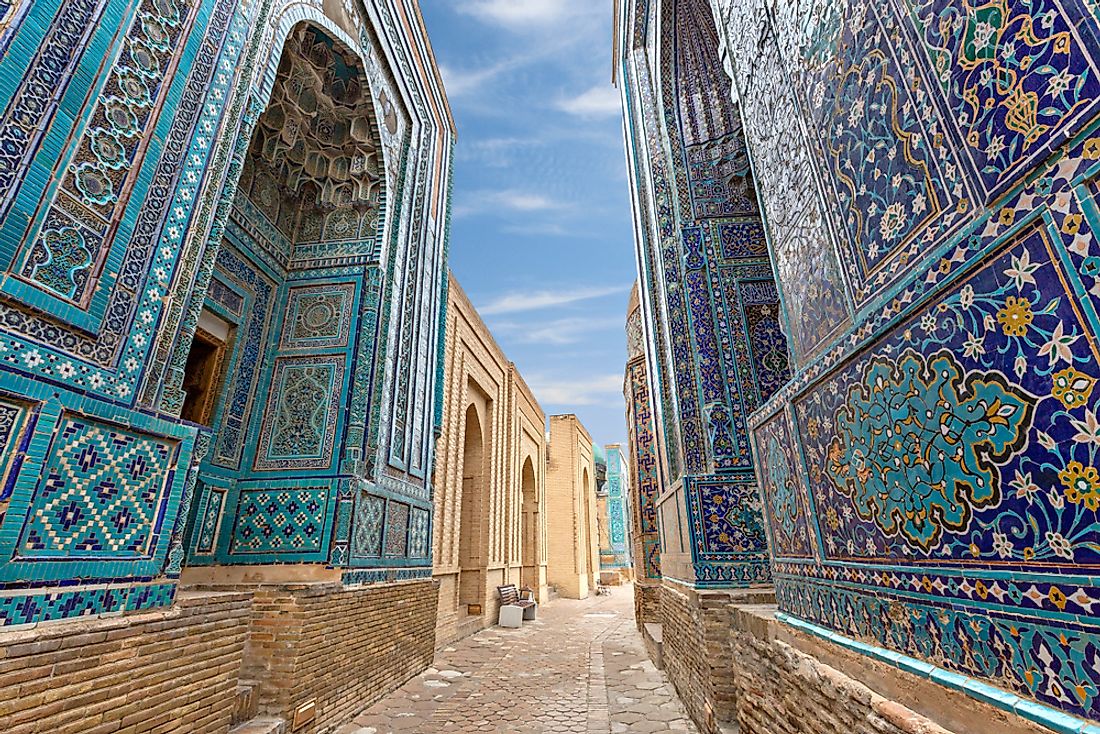10 Unique And Interesting Facts About Uzbekistan

Uzbekistan is a country found in Central Asia, sharing its borders with Turkmenistan, Afghanistan, Tajikistan, Kazakhstan, and Kyrgyzstan. The country gained its independence on August 31st, 1991 after the fall of the Soviet Union. Here are some interesting facts about Uzbekistan:
A Doubly Landlocked Country
Uzbekistan is a doubly-landlocked nation. There are only two such countries in the world, the other one being Liechtenstein in Europe. To reach any coastline from Uzbekistan, one has to cross at least two countries. The countries bordering Uzbekistan include Turkmenistan, Tajikistan, Kazakhstan, Afghanistan, and Kyrgyzstan, and these countries are also landlocked.
Powerful Empires
The region that is currently Uzbekistan was at one time part of the Persian Empire which was conquered by Alexander the Great in about 4th century BC. The region also was under the Mongols in the 13th century, when it was under the leadership of Genghis Khan who conquered the region and captured it from the Seljuk Turks. Later in the 16th century, the region came under Tamerlane great empire. In 1925 the region was under control of the Soviets, and it was known as Uzbekistan Soviet Socialist Republic.
The World’s Largest Open-Pit Gold Mine
Uzbekistan hosts the world’s largest open-cast gold mine, located in Muruntau in Qizilqum desert or Kyzyl Kum desert. The mine produces about 2 million ounces of gold every year, and the pit covers an area of 2.17 miles by 1.55 miles and a depth of 1,837 feet. It is estimated that the gold reserves in the Muruntau region, including those in the process of production to be approximately 170 million ounces of gold. The gold was first discovered in the region in 1958 initially the region was the source of turquoise from the time of the Silk Road period. However, it was not until the 1950s that the area was extensively explored. Commercial mining began in 1967, and it has been carried out ever since.
Largest Shrinking Lake
The Aral Sea was formerly the world’s fourth largest lake, covering an area of 26,300 square miles. However, from the 1960s, the lake has been gradually shrinking. The shrinking of the lake is attributed to the divergence of the main rivers away from the lake for irrigation projects. As of 1997, about 10% of the lake had disappeared and what remained were patches of smaller lakes. As of 2009, the larger part of the south-eastern lake had already dried up, and most of the southwestern lake had shrunk to form a small strip along the former southern sea. Images taken by NASA in 2014 showed the Eastern portion of the former Aral Sea which had wholly dried up and is presently known as Aralkum Desert.
UNESCO World Heritage Sites
Uzbekistan is home to five different UNESCO World Heritage sites. The Heritage sites are Itchan Kala, which was one of the last resting places of the caravans in the medieval period before crossing the desert to Iran, and it has more than 250 old houses. Itchal Kala was listed by UNESCO as a World Heritage site in 1990. Bukhara is one of the medieval cities in central Asia located on the famous Silk Road and is believed to be more than 2000 years old with several monuments which are still intact. In 1993 the site was listed by UNESCO as a cultural World Heritage site. Other sites found in the country include Samarkand, which is a Crossroads of cultures and was listed by UNESCO in 2001. Western Tien Shan is another World Heritage site in the country which was listed by UNESCO in 2016, while the historic center of Shakhrisyabz was listed in 2000.
Most Populous Soviet Republic
Uzbekistan has the highest population of all the five former Soviet Union Republics in Central Asia. According to estimates of 2019, Uzbekistan has a population of 32.98 million inhabitants, which is a huge increase compared to 2017 when the country had a population of 29.56 million inhabitants. In 2011, the country had a population of 29.12 million people.
The World’s 56th Largest Country
Uzbekistan is the world’s 56th largest independent state covering an area of about 172,700 square miles, and it is almost the same size as Spain in land area or the state of California in the US. The country distance from East to the west is 885 miles, while the distance from south to north is 580 miles.
National Parks and Nature Reserves
Uzbekistan is home to two national parks and nine nature reserves. The oldest national park in the country is Zaamin National Park which was established in 1926, and it was known at the time as the Guralash Nature Preserve.
Leading Economic Activities
The economy of Uzbekistan relies heavily on cotton as well as other natural minerals like natural gas, gold, and uranium. The country has the world’s 4th largest gold deposits of gold.
The First Inhabitants
The first people who are known to have occupied the region which is now Uzbekistan and other parts of central Asia were the Iranian Nomads known as the Scythians in the first Millennium BC. Others include the Fergana and Margiana.
Problems Facing Uzbekistan
One of the greatest challenges facing Uzbekistan is corruption, which has permeated to all levels in the society while growing rampant with each passing day. In 2005, the country was ranked at the position 137 out of 159 most corrupt countries in the world. In 2007 the country was ranked as the world’s 175 out of 179 most corrupt nations. It is reported that revenues from key sectors in the economy such as Cotton, gas, and gold are distributed among a small clique in the country, and the general population receives little or no benefits.











